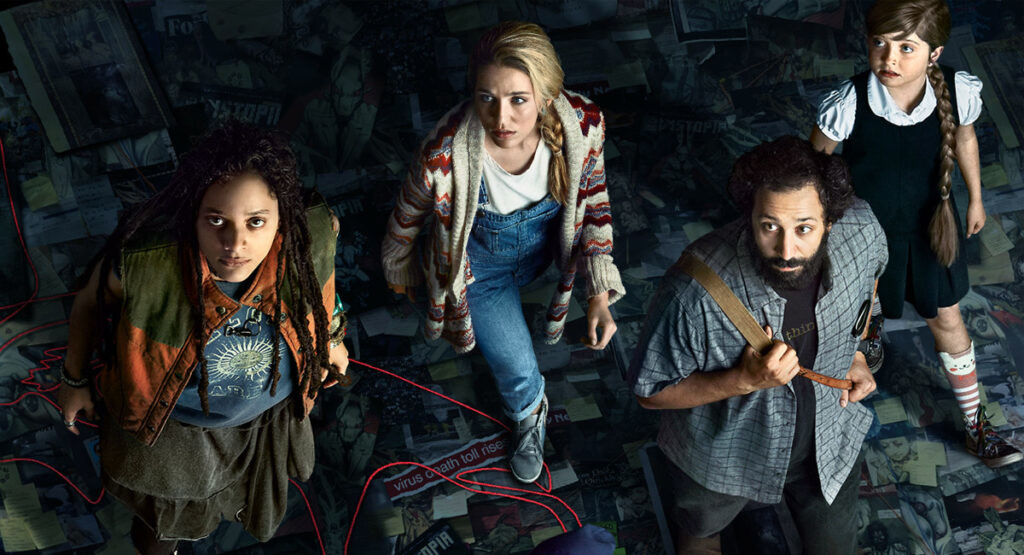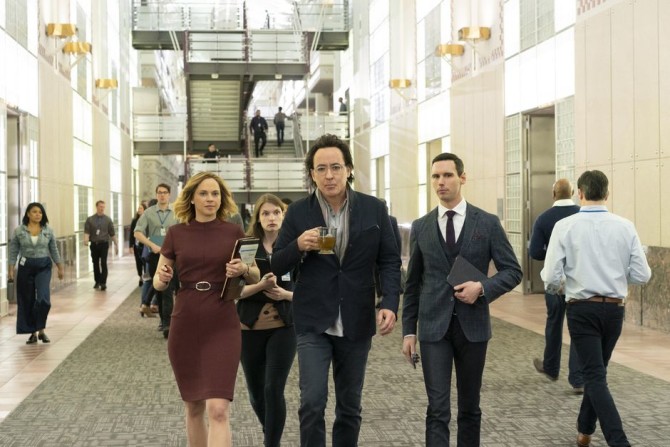Genre: Drama/Sort of Supernatural
Premise: When the sequel to a fringe graphic novel masterpiece unexpectedly emerges, the lone copy draws a group of superfans from different walks of life to buy it in a one-day only auction.
About: We have some weird connections to yesterday’s World War Z 2 review. This show is based on a British show written by Dennis Kelly. Who wrote yesterday’s script? Dennis Kelly. This script is written by Gillian Flynn. Gillian Flynn adapted her own book, Gone Girl, for David Fincher, the man who was supposed to direct Dennis Kelly’s script for World War Z 2. Did you follow all that? The show has recruited John Cusack, Rainn Wilson, and Happy Death Day star, Jessica Rothe. It will premiere on Amazon Prime.
Writer: Gillian Flynn (based on the original show created by Dennis Kelly)
Details: 65 pages
When it comes to TV shows that have the potential to be great, HBO has re-taken the pole position. You may remember when AMC and FX had some really great shows. And even Netflix, for a while, until they went algorithm crazy, favoring wackadoodle experiments such as The Floor is Lava, over the next House of Cards. So when they put something into production, I pay attention.
And yet, somewhere along the way, HBO gave up on Utopia. This happens quite a bit. HBO has a TON of shows in development and only lets the cream of the crop into the on-air lineup. Which leaves us to wonder if Amazon Prime is receiving a 1998 Chevy Impala with a bad transmission or a 2020 Tesla with some of them bulletproof windows. Let’s all hope it’s the latter. Cause I need a new show to watch!
After inheriting her grandfather’s cabin, Olivia and her hubby, Ethan, find a dark disturbing graphic novel in his home titled “Utopia.” Ethan looks it up online and realizes that it’s a sequel to the small but fiercely loyal fanbase of a graphic novel titled “Dystopia.” Figuring this might mean some *ka-ching*, Ethan posts online that he’ll be selling Utopia to the highest bidder at FringeCon this weekend.
Over the next 30 pages, we meet all the players. There’s hot Samantha, who’s a super hardcore Dystopia nut. There’s Wilson Wilson, an intense private guy who thinks the whole world is after him. There’s Grant, a 10-year-old kid. There’s Becky, who has a rare disease but is in a relationship with fellow Dystopia obsessive, Ian, who lives with his grandma.
All of these people know each other online due to their intense love for Dystopia. But none of them have met in real life. They don’t even know that Grant is 10. They think he’s a photographer for supermodels. That’s about to change since they agree to all get together at FringeCon and bid on Utopia.
On to FringeCon we go, where Olivia and Ethan have set up a hotel room where bidders come in one at a time, get to look at a single page from the book, then make a bid. Highest bid wins. By the way, this is where I should tell you that everyone in the group believes Dystopia predicts the future. It’s predicted numerous pandemics since it came out. And the sequel is said to have bigger, more dire, predictions.
Everybody makes their bid but no one here is rich. The highest bid doesn’t even crack 1k. So it sucks for them when the well off Carson (as far as I know, no relation) shows up and says he wants to take the comic off the market… for 20 grand! Ethan and Olivia say, “Ka-Ching” and sell it, thinking they just made out like bandits.
Except that a couple of hours later, two sketchy-looking dudes, Arby and Rod, show up demanding to know where the graphic novel is. They inform them Carson bought it. He’s in the penthouse. That’s not enough for them. They want to know everybody who looked at it. (spoilers) Ethan and Olivia get the sense that these aren’t a couple of angry buyers. These are dangerous people. Their sense is correct, cause Arby and Rod kill them. They then head up to the penthouse, where they learn of a disturbing development. Grant, the 10-year-old kid, has stolen it. And he’s getting away. To be continued…
Utopia makes a bold choice here in deviating from the original. In the original, we start out with a gruesome murder. Flynn, however, uses the first 45 pages to set up characters. There’s barely any story or plot. It’s us meeting character after character.
Now you may say, wait a minute Carson. You told us never to do this. Why does Gillian Flynn get to do it? Well, here’s the thing. You don’t have to add any plot to the first 40 minutes of your pilot script either. But if you’re going to go down that road, you better…
a) be really good at character creation.
b) be really good with dialogue.
Gillian Flynn is good at both. Plus, she has an advantage. She’s working with established material which already did some of the heavy lifting for her. It was a character-centric show, so she has the baseline for her characters set. Also, any character who didn’t work in the previous show, she can get rid of and replace with a character she thinks up. That’s a nice luxury to have when you’re writing something. Because, in my opinion, character creation is the hardest part of writing.
The point is, if you’re not using plot to hook us, you need to have been told numerous times that your character writing is strong and/or that your dialogue is strong too. Because they’re what’s going to be front and center without plot. And even if they’re “kind of good,” readers are going to tune out. The characters need to be “really good” or better.
Now what I found interesting about Flynn’s Utopia was that it took the opposite approach to Kelly’s pilot. Kelly put the first kill scene in the pilot’s teaser. Flynn puts her first kill scene all the way at the end of the pilot.
Which of these is the better choice? Do you kill right away? Or do you LEAD UP to the kill?
Each has a different effect on the audience. If you kill in the opener, it immediately grabs our attention. But then it’s gone. We can’t use it again. Or, if we do, it’s not as surprising anymore and, therefore, less impactful.
When you lead up to a kill, it gives the reader something to look forward to. If we establish that Arby and Rod are bad guys looking to do bad things and they’re on their way to FringeCon, we the reader are pulled along by a powerful line of suspense. We know that these two bad guys are going to collide with our heroes, which means we’re going to keep reading to find out what happens.
The downside of this choice is, not a lot of exciting things are going to happen prior to this collision. This means the reader is mainly reading setup and exposition. Not exactly the most riveting story experience.
Still, I would say that the second option is better because you get much more out of it. You get all that ongoing suspense. Whereas, if you kill right away, you suck up some of the story’s air. We’ve already seen the worst. It’s like that bad movie, U.S. Marshalls, the unofficial sequel to The Fugitive. They had that amazing plane crash scene in the opener and then nothing else in the script came close to it.
The problem is Flynn’s Utopia doesn’t take advantage of the second option. It never implies that the kill is coming. It doesn’t even imply the bad guys are bad. So we don’t get any build-up of that suspense, of that anticipation. Which means the kill is a surprise.
In screenwriting, you want to get the most bang for your buck out of every plot development. If the only entertainment we get from a scene happens within the scene itself, you’re leaving a ton of entertainment on the table. The right move would’ve been to heavily imply that Arby and Rod were going to do very bad things, which would’ve gotten so much more out of this plot point. As it stands, we get that surprising kill and— then it’s done.
But like I said, the characters are all really strong here. So I still enjoyed the experience. I still want to see what happens next.
Oh, and I wanted to give you guys a THIRD VARIABLE example from Utopia since I talked about that last Thursday. When Olivia and Ethan first find the book, they need to figure out what the book is. So they go on the internet on his phone. Now, we could’ve stopped there. He checks Google. Google tells them. Exposition handled. Scene over. But because they’re out in the middle of nowhere, Ethan keeps losing the connection in the middle of a Youtube explanation of what Utopia is. This is the THIRD VARIABLE that makes the scene more interesting. The explanation keeps stalling, forcing them to keep moving, creating more suspense, and making what could’ve been a boring straight-exposition scene into something a little more dramatic.
This show could be good assuming episodes 4-10 don’t devolve into “running around with your heads cut off” storytelling. I hope Flynn has a plan for that!
[ ] What the hell did I just read?
[ ] wasn’t for me
[xx] worth the read
[ ] impressive
[ ] genius
What I learned: “Olivia, hair now pulled pragmatically back in a bandana…”. This is an early description in the script. The funny thing is that I read it as “dramatically” instead of “pragmatically,” which created a different image in my head. Like she really went all out on putting her hair back. But when I realized it was “pragmatically,” I thought, “Oh, that’s more straight-forward,” and my image of the visual changed. This reminded me how much words matter when describing things, particularly adverbs. And how you can use them to change the tenor of the image. Note how all of these adverb substitutions create different images in your head, as well as make you think of Olivia differently.
“Olivia, hair now pulled lazily back in a bandana…”.
“Olivia, hair now pulled carefully back in a bandana…”.
“Olivia, hair now pulled defiantly back in a bandana…”.
“Olivia, hair now pulled playfully back in a bandana…”.
“Olivia, hair now pulled sharply back in a bandana…”.
“Olivia, hair now pulled joylessly back in a bandana…”.
“Olivia, hair now pulled painfully back in a bandana…”.
I read so many scripts where I never get any sense of the characters at all. Little things such as including the perfect adverb can help solve that problem. Not to mention, it’s a lot of fun trying to find the right adverb.



